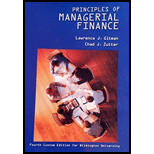
Principles of Managerial Finance
17th Edition
ISBN: 9781323419656
Author: Gitman
Publisher: PEARSON
expand_more
expand_more
format_list_bulleted
Question
Chapter 12, Problem 12.12P
a)
Summary Introduction
To determine: The risk adjusted
Introduction:
The difference between the present value of
b)
Summary Introduction
To discuss: Recommendation on the above findings
Expert Solution & Answer
Want to see the full answer?
Check out a sample textbook solution
Students have asked these similar questions
Can you provide correct answer?
The time value of money concept assumes that:
A) A dollar today is worth more than a dollar in the futureB) A dollar in the future is worth more than a dollar todayC) Money loses value only when interest rates riseD) Money value remains constant over time
Can you answer this question?
Which type of bond offers tax advantages?
A) Convertible bondsB) Municipal bondsC) Corporate bondsD) Junk bonds
I need help!
Which of the following is a source of external finance?
A) Retained earningsB) Bank loansC) Sale of assetsD) Cost cutting
Chapter 12 Solutions
Principles of Managerial Finance
Ch. 12.1 - Are most mutually exclusive capital budgeting...Ch. 12.2 - Prob. 1FOPCh. 12.2 - Prob. 12.2RQCh. 12.2 - Describe how each of the following behavioral...Ch. 12.3 - Briefly explain how the following items affect the...Ch. 12.4 - Prob. 1FOECh. 12.4 - Prob. 2FOECh. 12.4 - Describe the basic procedures involved in using...Ch. 12.4 - Explain why a firm whose stock is actively traded...Ch. 12.4 - Prob. 12.8RQ
Ch. 12.5 - Explain why a mere comparison of the NPVs of...Ch. 12.5 - What are real options? What are some major types...Ch. 12.5 - What is the difference between the strategic NPV...Ch. 12.5 - Prob. 12.12RQCh. 12.5 - Prob. 12.13RQCh. 12 - Prob. 1ORCh. 12 - Prob. 12.1WUECh. 12 - Prob. 12.2WUECh. 12 - Prob. 12.3WUECh. 12 - Prob. 12.4WUECh. 12 - Prob. 12.5WUECh. 12 - Prob. 12.1PCh. 12 - Prob. 12.2PCh. 12 - Prob. 12.3PCh. 12 - Prob. 12.4PCh. 12 - Prob. 12.5PCh. 12 - Prob. 12.6PCh. 12 - Prob. 12.7PCh. 12 - Prob. 12.8PCh. 12 - Prob. 12.9PCh. 12 - Prob. 12.10PCh. 12 - Prob. 12.11PCh. 12 - Prob. 12.12PCh. 12 - Prob. 12.13PCh. 12 - Prob. 12.14PCh. 12 - Prob. 12.15PCh. 12 - Prob. 12.16PCh. 12 - Prob. 12.17PCh. 12 - Prob. 12.18PCh. 12 - Prob. 12.19P
Knowledge Booster
Similar questions
- Diversification in investing reduces which type of risk? A) Market riskB) Systematic riskC) Unsystematic riskD) Liquidity riskarrow_forwardWhich type of bond offers tax advantages? A) Convertible bondsB) Municipal bondsC) Corporate bondsD) Junk bonds help!!arrow_forwardWhich type of bond offers tax advantages? A) Convertible bondsB) Municipal bondsC) Corporate bondsD) Junk bondsexplanation!arrow_forward
- Which type of bond offers tax advantages? A) Convertible bondsB) Municipal bondsC) Corporate bondsD) Junk bondssolutionarrow_forwardThe term 'liquidity' in business refers to:A. The ability to generate profitB. The ease with which an asset can be converted into cashC. The long-term financial stability of a companyD. The amount of debt a company carries need helparrow_forwardNo chatgpt! Which type of bond offers tax advantages? A) Convertible bonds B) Municipal bonds C) Corporate bonds D) Junk bondsarrow_forward
- I need correct answer! Which type of bond offers tax advantages? A) Convertible bonds B) Municipal bonds C) Corporate bonds D) Junk bondsarrow_forwardWhat is the main purpose of budgeting in a company? A) To eliminate all expensesB) To forecast and control costsC) To increase revenueD) To reduce taxes i need correct answer!!arrow_forward2. A 'competitive advantage' means:A. A company has lower prices than its competitorsB. A company has a unique product or service that gives it an edgeC. A company offers the same product as its competitorsD. A company has the largest market sharearrow_forward
- Which type of bond offers tax advantages? A) Convertible bondsB) Municipal bondsC) Corporate bondsD) Junk bondsneed help!arrow_forwardWhich type of bond offers tax advantages? A) Convertible bondsB) Municipal bondsC) Corporate bondsD) Junk bondsarrow_forwardWhat does "liquidity" refer to in finance? A) The profitability of a companyB) The ease of converting assets to cashC) The value of fixed assetsD) The number of outstanding shares i need answer.arrow_forward
arrow_back_ios
SEE MORE QUESTIONS
arrow_forward_ios
Recommended textbooks for you
 Essentials Of InvestmentsFinanceISBN:9781260013924Author:Bodie, Zvi, Kane, Alex, MARCUS, Alan J.Publisher:Mcgraw-hill Education,
Essentials Of InvestmentsFinanceISBN:9781260013924Author:Bodie, Zvi, Kane, Alex, MARCUS, Alan J.Publisher:Mcgraw-hill Education,

 Foundations Of FinanceFinanceISBN:9780134897264Author:KEOWN, Arthur J., Martin, John D., PETTY, J. WilliamPublisher:Pearson,
Foundations Of FinanceFinanceISBN:9780134897264Author:KEOWN, Arthur J., Martin, John D., PETTY, J. WilliamPublisher:Pearson, Fundamentals of Financial Management (MindTap Cou...FinanceISBN:9781337395250Author:Eugene F. Brigham, Joel F. HoustonPublisher:Cengage Learning
Fundamentals of Financial Management (MindTap Cou...FinanceISBN:9781337395250Author:Eugene F. Brigham, Joel F. HoustonPublisher:Cengage Learning Corporate Finance (The Mcgraw-hill/Irwin Series i...FinanceISBN:9780077861759Author:Stephen A. Ross Franco Modigliani Professor of Financial Economics Professor, Randolph W Westerfield Robert R. Dockson Deans Chair in Bus. Admin., Jeffrey Jaffe, Bradford D Jordan ProfessorPublisher:McGraw-Hill Education
Corporate Finance (The Mcgraw-hill/Irwin Series i...FinanceISBN:9780077861759Author:Stephen A. Ross Franco Modigliani Professor of Financial Economics Professor, Randolph W Westerfield Robert R. Dockson Deans Chair in Bus. Admin., Jeffrey Jaffe, Bradford D Jordan ProfessorPublisher:McGraw-Hill Education

Essentials Of Investments
Finance
ISBN:9781260013924
Author:Bodie, Zvi, Kane, Alex, MARCUS, Alan J.
Publisher:Mcgraw-hill Education,



Foundations Of Finance
Finance
ISBN:9780134897264
Author:KEOWN, Arthur J., Martin, John D., PETTY, J. William
Publisher:Pearson,

Fundamentals of Financial Management (MindTap Cou...
Finance
ISBN:9781337395250
Author:Eugene F. Brigham, Joel F. Houston
Publisher:Cengage Learning

Corporate Finance (The Mcgraw-hill/Irwin Series i...
Finance
ISBN:9780077861759
Author:Stephen A. Ross Franco Modigliani Professor of Financial Economics Professor, Randolph W Westerfield Robert R. Dockson Deans Chair in Bus. Admin., Jeffrey Jaffe, Bradford D Jordan Professor
Publisher:McGraw-Hill Education